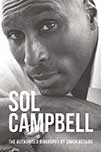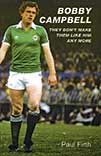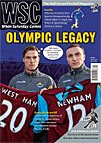Search: 'Sol Campbell'
Stories
 by Simon Astaire
by Simon Astaire
Spellbinding Media, £18.99
Reviewed by Adam Powley
From WSC 327 May 2014
Major football biographies have taken a bit of a battering of late, with many publishers offering huge advances on books which failed to sell. Now, doubting commissioning editors are all looking for an “angle”. Sol Campbell’s biography, written by Simon Astaire, fits the bill. The headline grabber is inevitably only a small part of the story, but Campbell’s assertion that he was denied the England captaincy due to the colour of his skin has been a publicist’s dream.
It is also a serious accusation and one that has received widespread condemnation. One criticism is that it negates the more serious issues about lingering racism in football. It is also challengeable factually as well as being fodder for those who see Campbell as a whinger. As far as this book goes, it’s another example of Campbell’s lifelong grudge about being neglected.
At its heart, for all the extensive memoir of a hugely successful career, the book is primarily about Campbell’s resentments, and in particular the fractured relationship with his late father. Yet for someone so prone to self analysis, he shows a glaring lack of self awareness. He moans about the England manager Steve McClaren failing to call him but leaves his future wife in the lurch by not answering her calls for three months. And he agonises about his father’s distance while all but ignoring his own record as a parent who has had little or no contact with one of his children.
This will chime with the many Tottenham fans who still dislike Campbell for his move to Arsenal. There is some welcome context on the build-up to that event, and the pure logic of the move is evident. But his preening conviction – the other extreme of Campbell’s complex character – simply doesn’t countenance that it might not have been the most honourable of decisions.
Emerging from a difficult upbringing, Campbell shouldn’t be admonished for his ambition, but doesn’t appear to appreciate the consequences of his actions. He is now playing down the England captaincy accusation, like letting off a firework then complaining about the bang. In a Newsnight interview with non-football fan Jeremy Paxman, the message was hopelessly muddled – a result of Campbell trying to position himself as the intelligent footballer with something profound to say, but lacking articulacy.
Campbell fares better expressing himself via his biographer. He has interesting perspective on his experience at Lilleshall, while the chapter on life at Arsenal under Arsène Wenger and David Dein is enlightening. But the navel gazing overwhelms. The hitherto publicity-shy Campbell is laid bare as needy, introverted, a maddening mix of single-minded focus and debilitating reserve.
For all that, Astaire does a good job of keeping the narrative on track, while extracting genuine insight into playing at the elite level. The passages on the England v Argentina World Cup games convey the sheer intensity these contests generated. The antics of the Munto snake-oil salesmen who hijacked Notts County – and made a fool out of Campbell – make for a bleakly comic contrast.
This, however, is a biography only in name. It would have been productive, for example, to hear from the mother of Campbell’s first child, or what his 11 siblings have to say, yet, over nearly 300 pages, only three of them are even mentioned by name. “Why don’t people understand I’m just different to most professional footballers?” Sol pleads. He just wants to be loved, it seems – but he is hard work to warm to.
 They don’t make them like him any more
They don’t make them like him any more
by Paul Firth
Bantamspast, £12
Reviewed by Jason McKeown
From WSC 314 April 2013
It’s long been a mystery to me how people of a certain age will lament the behaviour of modern day footballers and then, within the same breath, romanticise the bad lads of decades earlier. The story of Bobby Campbell, Bradford City’s all-time leading scorer in two spells between 1979 and 1986, features tales of drinking sessions, fighting and police run-ins that would prompt moralistic howls of derision were he playing today. Yet the book’s tagline – “They don’t make them like him any more” – invites us to consider that football is worse off today for the absence of someone whose off-field antics have become as much a part of Valley Parade folklore as his 131 Bantams goals.
Still there is an almost apologetic tone to some of the stories of punch-ups with bouncers and drinking in the dressing room before matches, with biographer Paul Firth focusing more on Campbell’s many admirable qualities. Any footballer who recovers from a broken leg at 19, plays for nine different clubs across three continents and makes the Northern Ireland 1982 World Cup squad after a season in Division Four has quite a story to tell.
The book is a combination of Firth’s narration and the views of Campbell himself, which are interwoven throughout. At times the switching back and forth into the subject’s direct quotes feels awkward but the striker’s blunt statements add a valuable layer of understanding into how his career unfolded. Campbell is brutally honest about the sectarian troubles he experienced growing up in Belfast (“I had a few friends who were assassinated, one just for courting a Catholic girl”) and why his career, which started promisingly at Aston Villa, at one stage drifted into the relative obscurity of playing part-time in Australia.
Campbell’s two spells at Bradford City, his heyday, take in two promotions, the club almost going bankrupt (he had to be sold to Derby to raise money) and the tragic Valley Parade fire of 1985. You get a sense that, although Campbell had something of a hardman reputation, he deeply cared about team-mates, supporters and the club. The book’s most memorable moments are provided by interviewees who played alongside Campbell. They praise both his playing ability and caring nature, such as when he raced off a team bus that had crashed into a car to try to save the lives of two children: “It’s typical of the person, going in and not being afraid of anything,” former team-mate Stuart McCall says.
Following the Bradford fire, a City supporter tells of Campbell’s regular hospital visits to various supporters’ bedsides, as he and many others recovered. Despite a decent final spell at Wigan, Campbell was apparently fed up with football when he retired at the age of 32. Nonetheless, his biographer does an excellent job conveying the lasting legacy of this unlikely hero.
 While there is a certain inevitability about this home victory, it’s only August and these two clubs have very different expectations and requirements from a season in League One, writes Julian McDougall
While there is a certain inevitability about this home victory, it’s only August and these two clubs have very different expectations and requirements from a season in League One, writes Julian McDougall
Away, at Hillsborough. In the days leading up to and following this match, it is in the news again with speculation about relatives of the 1989 disaster victims getting access to crucial documents and Billy Bragg releasing a song about the phone hacking scandal called Scousers Never Buy The Sun.
 Spurs’ late bid for the Olympic Stadium was a flawed one but it forced Mat Snow to assess what he really feels about the club he supports
Spurs’ late bid for the Olympic Stadium was a flawed one but it forced Mat Snow to assess what he really feels about the club he supports
When the Spurs board first floated the notion that, rather than expand and upgrade White Hart Lane, the club would move to the Olympic Stadium seven miles away in Stratford, I didn’t take it seriously. Nor did many other Spurs fans I know. We all figured that the board were proposing this Plan B to bluff the local council and other official bodies which were, so we heard, attaching ever more strings and dangling hefty price tags from the necessary permissions to redevelop as the board wanted. But very quickly Plan B turned into a real bid and, right then and there, every single Spurs fan was put on the spot.